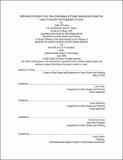Rethinking the bottom line : how externalities of private development impact the value proposition and negotiation process
Author(s)
O'Connor, Caitlin (Caitlin A.)
DownloadFull printable version (735.3Kb)
Other Contributors
Massachusetts Institute of Technology. Dept. of Urban Studies and Planning.
Advisor
Lynn Fisher and Susan Silberberg.
Terms of use
Metadata
Show full item recordAbstract
In assessing feasibility of a project, developers typically use a classic financial model Discounted Cash Flow (DCF) to forecast the private benefit that accrues to the developer and financial partners. DCF is a rational method to approximate the value of a deal, but the method neglects to recognize that developments are both private assets and also possess some qualities of a public good. Buildings in historic districts, along cultural trails or art corridors are clear examples, but most developments share similar attributes that many individuals, beyond the building's users, enjoy. Most developers already understand this concept intuitively, but one of the goals of this thesis is to create tangible tools to be used in the development/redevelopment process to capitalize on undervalued projects or elements of a project and in a timeframe that is socially optimal. Making these "intangible impacts" explicit will not only help developers identify undervalued projects, but may prove a powerful argument in negotiations with city officials and with capital partners. One of the contributions of this work is to bring disparate bodies of literature together and relate them to the larger questions of total property value and the optimal allocation of scarce resources in real estate.
Description
Thesis (S.M. and M.C.P.)--Massachusetts Institute of Technology, Dept. of Urban Studies and Planning, 2005. This electronic version was submitted by the student author. The certified thesis is available in the Institute Archives and Special Collections. Includes bibliographical references (leaves 101-105).
Date issued
2005Department
Massachusetts Institute of Technology. Department of Urban Studies and PlanningPublisher
Massachusetts Institute of Technology
Keywords
Urban Studies and Planning.